Dilmah: Growing authenticity in tea
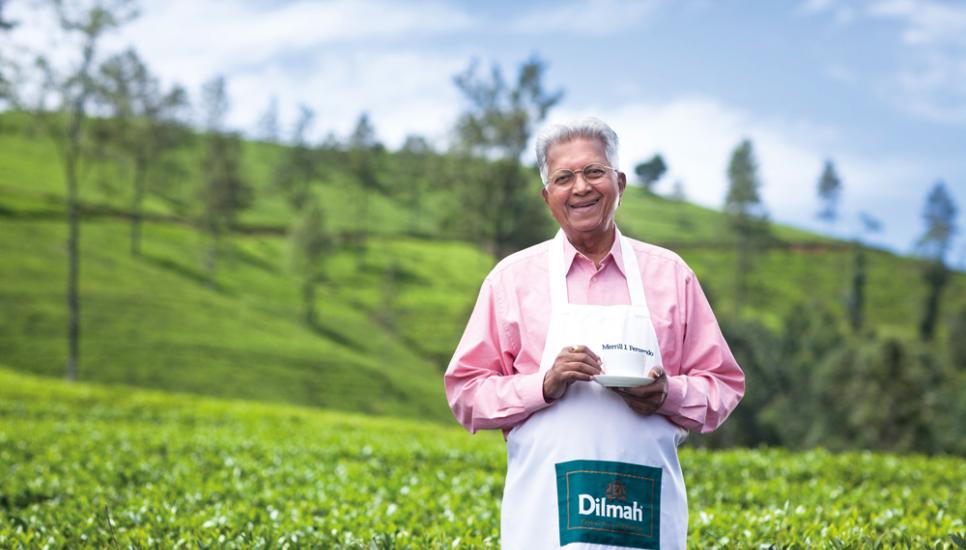
Dilmah was the first producer-owned tea brand to offer tea picked, perfected, and packed at its place of origin. Pioneered by founder and chairman Merrill J Fernando, the Sri Lankan has built the world’s third largest tea brand and a multigenerational family business over 30 years, based on ethics and philanthropy. “Dilmah is not a brand of tea, Dilmah is a philosophy of caring and sharing,” he tells James Beech, over a cup.
Merrill J Fernando is a man on more than one mission. Hailed as the world’s most experienced tea maker, the founder of Dilmah Tea is chairman, farmer, industry revolutionary, taste maker, investor, entrepreneur, brand ambassador, award-winning international trouble shooter, Christian, and philanthropist.
Warm and humble with a twinkle in his eye, I meet Fernando in Dubai where he is representing his family business on the stand at the city’s major food festival.
He flew directly from another food festival in New Zealand, just two of the global engagements the 87-year-old fulfils when many of his contemporaries are enjoying a slower pace in life.
“Our distributors around the world want me to come and meet people and explain my story, and as long as I have the energy to do that, I will come,” he says, decisively.
And what a feat-filled story it is.
 Fernando developed the only tea brand based in a tea-producing country from the ground up, now sold in more than 100 countries. He championed garden freshness, authenticity, and variety in genuine Ceylon tea from a single origin in the face of a conservative post-colonial industry accustomed to cheap blends, dubious branding, and retaining profits in the west.
Fernando developed the only tea brand based in a tea-producing country from the ground up, now sold in more than 100 countries. He championed garden freshness, authenticity, and variety in genuine Ceylon tea from a single origin in the face of a conservative post-colonial industry accustomed to cheap blends, dubious branding, and retaining profits in the west.
He made Dilmah Tea a trusted household brand by becoming the international smiling face of Ceylon tea on packaging and advertising, complete with his catchphrase: “Do try it!”
But then his attitude towards business and society has always been progressive. Years before the resurgence of consumer interest in quality tea, organic produce, and farmers’ markets, his company launched professional development courses and classes to enhance appreciation for the herb and inspire the next generation to work in the tea industry.
He ensured all packaging profits are retained in Sri Lanka and funds the MJF Charitable Foundation and Dilmah Conservation in aid of the disadvantaged and the environment. Governments consult him on their efforts to alleviate poverty and bring peace through entrepreneurialism. He was presented with the Business for Peace award and named one of the five Oslo Business for Peace Honourees, by the award committee of Nobel Laureates in Peace and Economics, in 2015.
 “Caring for the consumer, caring for our workers, and sharing with the poor, that is what we do,” Fernando says.
“Caring for the consumer, caring for our workers, and sharing with the poor, that is what we do,” Fernando says.
“Most of the founders’ brands get famous or popular after the founder is dead and gone. Here, God has blessed me enormously and I am seeing the fruits of my labour.
“I came from a humble family, an ordinary environment. And today, those values I acquired in humble beginnings are my strengths and that is what I have passed on to my two sons.”
At the heart of the business is a father and his sons: Fernando as founder and chairman of the umbrella MJF Group, with eldest son Malik J Fernando and Dilhan C Fernando, whose names form the flagship tea brand.
“I have some good employees, but my sons work as hard as I did when I was young, they are very dedicated, it is a very strong family company,” he says.
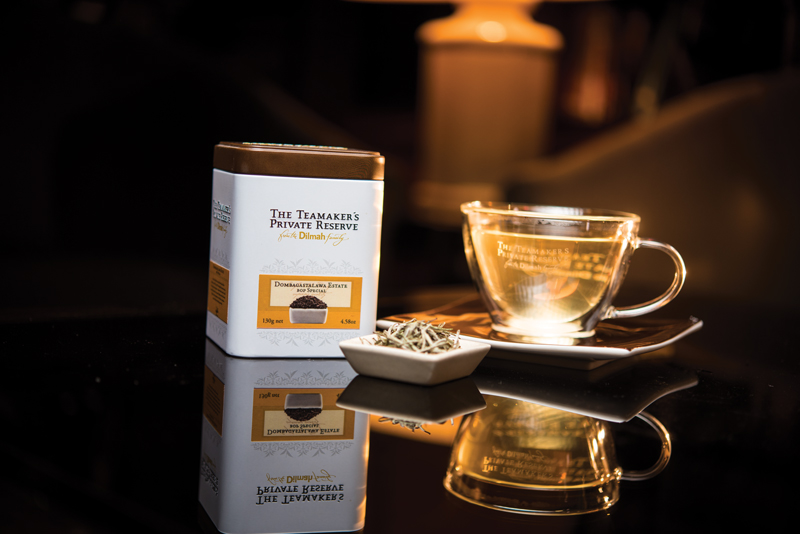
Bringing ambition to the boil
Fernando says he revolutionised the tea industry by thinking differently, “by looking at the underdogs and the people who are picking the leaves, sweating their guts out, and watching multimillionaires being made from their hard work outside our country.
“So when I saw that, I thought, this is a terrible imbalance, I wish I could correct it. It dawned from there.”
Although his intention was to become a lawyer, Fernando’s career in the tea industry began when he was one of the first Sri Lankans to be selected as a tea taster for British tea producers 66 years ago. Sri Lankans were not usually employed as tea tasters—the British thought the natives ate too much curry so their palates were ruined—but Fernando was recommended to take one of six positions which opened.
 After training to cater for consumers’ myriad of tastes over three months in the Sri Lankan outposts of the tea empire, young Fernando moved to post-war London and worked in several tea merchants on Mincing Lane, the centre of the world’s tea and spice trade for more than a century. Over four years, he witnessed the commodification, trading, and exploitation in the salesrooms, auctions, and packing houses on “the Street of Tea”, as it was known.
After training to cater for consumers’ myriad of tastes over three months in the Sri Lankan outposts of the tea empire, young Fernando moved to post-war London and worked in several tea merchants on Mincing Lane, the centre of the world’s tea and spice trade for more than a century. Over four years, he witnessed the commodification, trading, and exploitation in the salesrooms, auctions, and packing houses on “the Street of Tea”, as it was known.
He was dismayed by what he saw.
“There they import Ceylon tea. It is the finest quality without any argument, therefore also the most expensive, and Ceylon tea has an invaluable image with consumers.
 “They would get tea from Africa, Indonesia, various countries, and mix with probably 75% Ceylon tea to bring the cost down, but brand it as Ceylon tea. I thought, ‘My goodness, in 10 to 15 years’ time, there will be so many brands of Ceylon tea without any Ceylon tea in sight’.
“They would get tea from Africa, Indonesia, various countries, and mix with probably 75% Ceylon tea to bring the cost down, but brand it as Ceylon tea. I thought, ‘My goodness, in 10 to 15 years’ time, there will be so many brands of Ceylon tea without any Ceylon tea in sight’.
“So I thought, how wonderful if I can have my own brand of tea, which will be the finest tea on earth, and I will share my profits with the plantation workers.”
Fernando worked up the ranks at the venerable English tea company AF Jones & Co from 1954, at the time itself a family business operated by Arthur Frederick Jones and his two sons Alan and Dennis.
By 1962 and back home in Sri Lanka, Fernando struck out on his own. Customers followed the young entrepreneur when he formed his eponymous company Merrill J Fernando and hired 18 dedicated employees to trade in bulk tea.
He remembers working 20-hour days.
“After the first year I started making profits, which were more than I expected. So I had to decide, am I going to build bank balances or am I going to share my success with the less fortunate? I opted for the latter and today I can say I achieved both.
 “I asked my employees how can I help them and they said I was already. So then I said ‘I will help your children. I will give them all the school books, stationery, clothes, shoes, and I will give scholarships to the brighter students’. Today, I have 1,200 workers in the Dilmah factory and several thousand in the plantations whose families have the same benefits.”
“I asked my employees how can I help them and they said I was already. So then I said ‘I will help your children. I will give them all the school books, stationery, clothes, shoes, and I will give scholarships to the brighter students’. Today, I have 1,200 workers in the Dilmah factory and several thousand in the plantations whose families have the same benefits.”
The tea leaf grower still dreamed of launching his own brand of tea picked and packed at the source and took the initiative in 1988 at the age of 58. He chose the name Dilmah, not only after his children, but also to show he considered the brand his third child.
Fernando still has an affection for England, decades after his tumultuous London experience.
He sent both sons to the Catholic school Stonyhurst College in Lancashire between 1977 and 1986, far from the civil war raging in Sri Lanka, but says he was sure to bring them home every holiday so they did not forget their roots.
Malik graduated from Babson College near Boston in the US and Dilhan graduated from the London School of Economics and Political Science.

The boys always knew they would start their careers from scratch, as their father had, and started working for the family business on the factory floor. They toiled in each division and were taught the business directly by Fernando.
Today Fernando’s job title is founder and chairman of MJF Group—the holding company for its expanding operations. His sons work closely alongside: Malik as Dilmah Tea operations director and managing director of the off-shoot luxury boutique resorts Resplendent Ceylon, as a self-described “accidental hotelier”.
In 2005, Resplendent Ceylon began converting five former British colonial planters’ bungalows into spectacular luxury villas. The resort is the most expensive and exclusive visitor accommodation on the island and the only Sri Lankan member of the global luxury fellowship Relais & Châteaux.
Younger son Dilhan drives the Dilmah brand’s innovation and directly supervises the work of his father’s MJF Charitable Foundation and Dilmah Conservation.
Dilmah remains the flagship brand of the vertically integrated parent Dilmah Ceylon Tea Company PLC which posted revenues of LKR7.24 billion ($47.4 million) in 2016.
It controls the private MJF Teas Ltd and the public Ceylon Tea Services Ltd, of which the family retains 89% of shares, Fernando says.
“The company was floated in 1982, with capital of LKR10 million ($470,370*) as the government persuaded me to go public to give people an opportunity to invest in tea and they gave me some fantastic tax-free facilities for many years and other advantages.
“At that time the public company concept had not come to Sri Lanka, but it was oversubscribed seven times. Anybody who invested LKR10,000 through bonus shares in 1982, has close to 20 times that. An investment of LKR10,000 would have got dividends of about LKR4.5 million and the investment today is worth LKR17 million.”
Ceylon Tea Services reported post-tax profits of LKR1.62 billion in the year to 31 March 2016, its greatest profit in four years and a spectacular 102% increase from LKR801.47 million, a year earlier. The company paid a dividend of LKR30 per share in 2016, up from LKR22.50 the previous year.
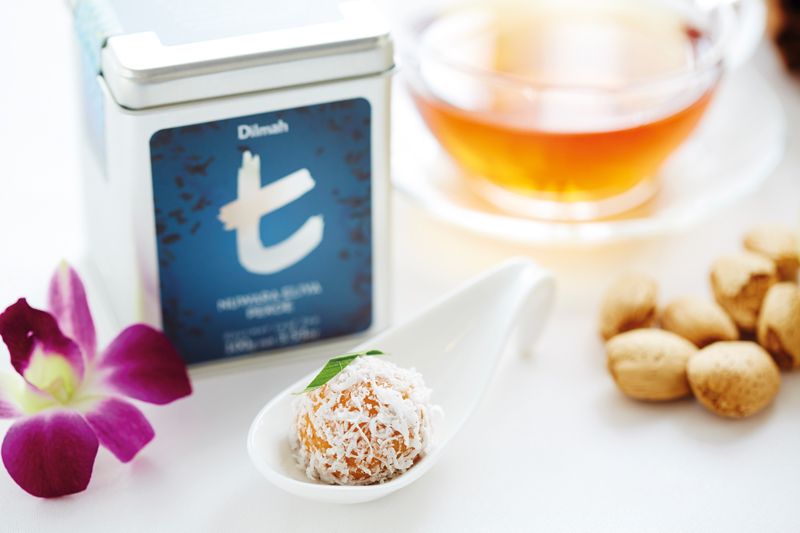
Fuller flavour
The family refuses to rest on its laurels of authenticity, chasing constant innovation. Fernando says they are “redefining quality”, as Sri Lanka faces competition from automated low-cost rivals in Kenya, India, and China in the $38 billion global tea industry.
They approach tea the way family businesses producing premium single estate wines and spirits approach the vines and distilleries—and Fernando likens low grown tea to cabernet sauvignon and high grown tea to chardonnay.

There is a hip artisanal tea to suit every taste in “the t-Lounge by Dilmah”, billed as an upscale, elegant café designed around the enjoyment and appreciation of fine tea; complemented by tea-inspired food. Dilmah fine tea, served hot, chilled, sparkling or in cocktails, mocktails or shooters are served in t-Lounges in Sri Lanka, Malaysia, Indonesia, Philippines, India, and Brunei.
Dilmah is expanding particularly in the Middle East, with its third t-Lounge being built in Kuwait. The brand opened its debut lounge in Dubai’s Ibn Battuta Mall in January 2017, the first of seven planned in the United Arab Emirates in the next three years.
Originally an initiative of Dilhan’s to help promote their brand’s points of difference, the Dilmah School of Tea taught its first 35 students the history, manufacture, culture, and versatility of tea gastronomy and tea mixology in 2007. The roaming school in February 2017 involved 145 participants and top chefs around the world with the latest in Dubai in September and the next back in Sri Lanka in early 2018.
There’s a digital dimension to the tea maker too with its School of Tea E-Learning and Tea Inspired eBooks through the sophisticated DilmahTea.com website, through to an online radio station, Tea Radio, launched in 2015.
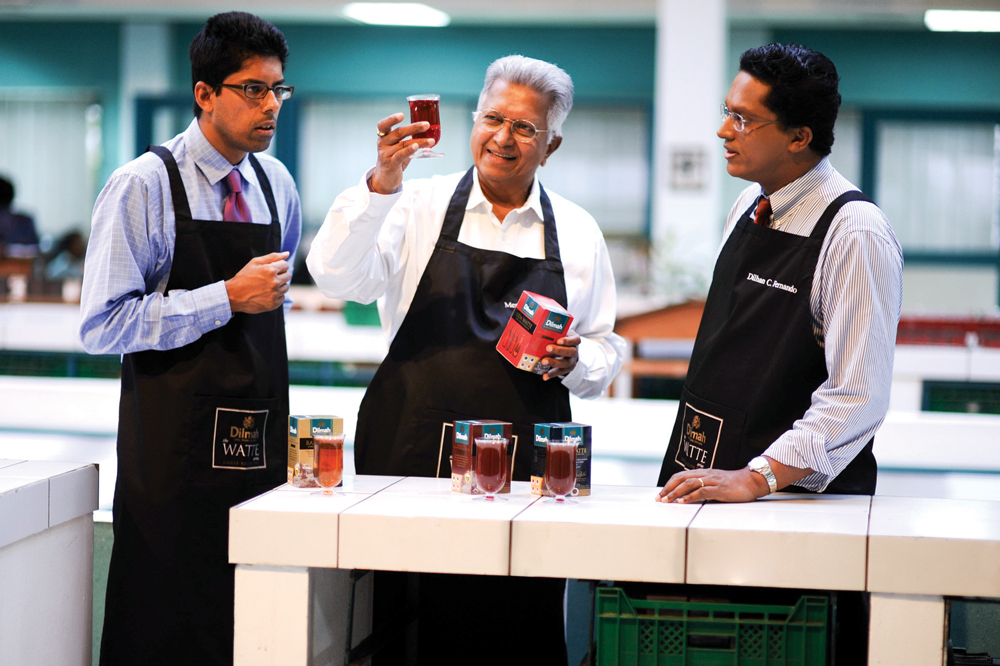
Tea break
How do the Fernando trio communicate while fitting in international travel and overseeing its many businesses? Once a week family business matters and their interests in 40 companies are discussed over a long lunch. Final approval and funding remains with Merrill.
“They do not sometimes agree 100% with my views but eventually my wish prevails,” he says.

“But on certain matters I say go ahead and do it. Most of the time now Dilhan has certain concepts which I do not agree with but I say, ‘Go and see what happens’.”
There is a growing sense the empire is becoming too unwieldy for one or even three people to control. Their tea division alone involves plantations, brokering, and exports, then there are the subsidiary companies, such as Printcare Ltd. Fernando started Printcare in 1979 to develop packaging for the tea bag sales and it has grown into the largest printing and packaging company in Sri Lanka (see box-out).
Fernando has a plan to make their family catch-ups more formalised soon after our interview, with a scheduled weekly meeting and key performance indicators set. Fernando is also preparing to table rules to a family trust for his cherished MJF Charitable Foundation, which he founded and where he serves as settlor.
Malik and Dilhan are among the six trustees of the foundation, one of whom is Himendra Ranaweera, also the non-family chief executive and deputy chairman of MJF Group.
In addition to benefits, workers earn bonuses and salary increments on a points system Fernando devised and he insists his door is always open to them.
 Making philanthro-tea work
Making philanthro-tea work
Fernando’s desire to help others is influenced as much by his mother’s generosity as his faith. Whenever he was lucky enough to get sweets or chocolate as a boy, Fernando’s mother would break the treat in half and give one-half to the nearest child, despite his protests.
As an adult he dedicates a large percentage of the company’s revenue, “to make the poor hopeful and prepare a better future for their children. And we have enormous results in that, you cannot believe the results we achieve. Very often I come home and cry”.
In 2003, he founded and now chairs the MJF Foundation which “focuses on long-term sustainability through the empowerment of individuals, families, and communities,” starting with higher education for impoverished plantation workers. Humanitarian initiatives include empowerment for women, the “differently-abled” and those affected by 30 years of Sri Lanka’s civil war. By 2015, the foundation had directly or indirectly benefited the lives of more than 100,000 underprivileged Sri Lankans.
The family’s commitment to protecting the environment, while nurturing livelihood development, was affirmed in 2007 with the creation of Dilmah Conservation. Dozens of green initiatives are ongoing under the four categories of sustainability, biodiversity, heritage, and communications.
In March this year Dilmah fulfilled the pledge made by Fernando in 2014 to become a carbon neutral facility, to reduce the operation’s impact on the environment.
 Father and sons have made corporate social responsibility part of the DNA of their business. They pledged in 2005 to follow the best practice principles declared in the 12 Principles of Dilmah in every aspect of their business and in the conduct of their workers, staff, and management.
Father and sons have made corporate social responsibility part of the DNA of their business. They pledged in 2005 to follow the best practice principles declared in the 12 Principles of Dilmah in every aspect of their business and in the conduct of their workers, staff, and management.
“I am just an ordinary man but God has given me a mission,” Fernando says.
“I get so much satisfaction out of what I do and I want to do more and more. Some of the wealth that some of us acquire during our lifetime, must be shared while you are still around.”
Today the octogenarian is clear on his succession plan and contemplates the future.
His sons “will take all the management and there will be a family board looking after my affairs, then a board of trustees. I will ensure that the foundation gets a substantial contribution and I will probably get some payment out to employees also.”
Fernando says he is “very confident” the third generation of his family will join the family business’s expansive portfolio when they are ready. Malik has two daughters studying medicine and business at UK universities. Dilhan has a son and two daughters at school age.
“I am putting my shares into a trust so the children, for generations, will get dividends and income with the trustees,” Fernando says.
The patriarch is certain Dilmah Tea will remain a principled family business and a just cause for his grandchildren as it is for him and his sons.
“I believe Dilmah will become more famous as the world’s only ethically-produced tea and, in fact, perform as the only brand of tea that a consumer can trust for integrity, quality, freshness, and for the finest and the most effective form of corporate social responsibility.
“Dilmah is not a brand of tea, Dilmah is a philosophy of caring and sharing.”

Millennials: Generation T
Fernando is seeing first-hand the appreciation for authenticity from the next generation of consumers—25% of Dilmah tea consumers are people between the ages of 16 to 25.
According to Euromonitor, the market for tea is expected to grow by 5.4% annually up to 2019, mainly because young, affluent consumers are responsive to the increased awareness of flavours and origin.
“High-end tea salons and bespoke cafés are becoming more prominent in the retail landscape,” Euromonitor says.
“The trend is leaning towards experience and branding of tea, with consumers also looking for increased personalisation. Tea sommeliers help high-end consumers select flavours according to tastes and type of tea.”
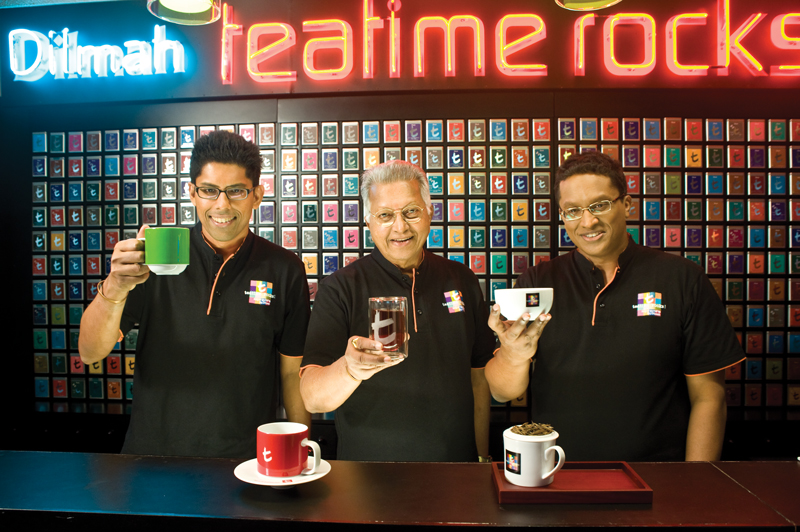
Steeped in history: Brewing Dilmah Tea
1867 Scottish planter James Taylor establishes first commercial tea plantation at Loolkandura Estate in Kandy District of Ceylon (now Sri Lanka)
1930 Merrill Joseph Fernando is born in the village of Pallansena in south-western Ceylon
1948 Fernando trains as tea taster in London the same year Ceylon gains independence from the United Kingdom
1962 Fernando starts his eponymous company Merrill J Fernando to trade in bulk tea
1965 Ceylon becomes the world’s largest tea exporter but industry still controlled by British who export, blend, and brand raw tea overseas
1972 Ceylon officially renamed the Democratic Socialist Republic of Sri Lanka
1979 Fernando opens subsidiary Printcare to package his tea and it expands into a variety of print media services
1983 Sri Lankan Civil War begins
1988 Dilmah Tea launches and breaks into the competitive global tea market when Australian supermarket chain Coles begins to stock its range
1989 Son Dilhan C Fernando joins the family business aged 19
2003 The MJF Charitable Foundation launches to spend Dilmah sales revenue on uplifting projects in the communities and for individuals
2005 The family moves into tourism with luxury visitor accommodation venture Resplendent Ceylon
2007 Dilmah Conservation launches in 2007 to incorporate environmental and wildlife conservation efforts into the work of the MJF Charitable Foundation
2009 Sri Lankan Civil War ends with more than 100,000 civilians and 50,000 fighters killed
2015 Fernando receives the Business for Peace Award as one of the five 2015 Oslo Business for Peace Honourees, by the Award Committee of Nobel Laureates in Peace and Economics
2016 He receives the FIRST Award for Responsible Capitalism from Philip Hammond, British Chancellor of the Exchequer






